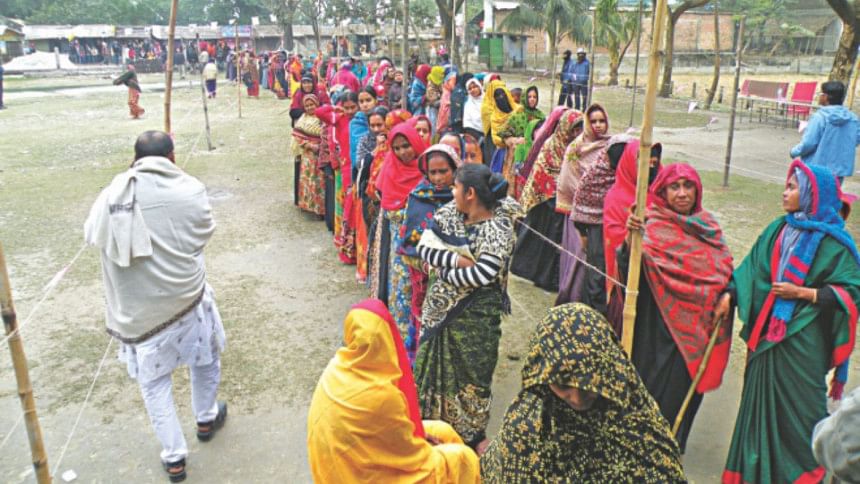For a stronger democracy

The UN Resolution 347180 (1979) states that "the peace and welfare of the world require maximum participation of women on equal terms with men in all fields." In line with this, the concept of gender equality in relation to electoral and political participation is internationally recognised as a fundamental factor for transparent and accountable governance, sustainable development and social cohesion.
At its 48th session held on March 14, 2004, the UN Commission on the Status of Women agreed to "ensure equal access of women in all stages of the electoral process including to consider the adoption of measures for increasing women's participation in elections through, inter alia, individual voter registration, temporary gender-specific positive actions and access to information, representation in bodies administering elections and as election monitors and observers, as well as encouraging political parties to involve women fully and equally in all aspects of their operations."
"Democracy without women is impossible," while an election cannot be called inclusive if it fails to ensure that all eligible women and men are given the opportunity to vote and choose their elected representatives. The government, political parties and the election management bodies (EMBs) around the world have to play a significant role in promoting women's electoral and political participation—although due to the effective actions of the above-mentioned stakeholders, women have, over the last few decades, made significant strides in politics and elections, along with some other areas. During 1995-2015, the percentage of women in parliaments doubled from 11 to 22 percent. But, the overall change in recent years has not been significant. Hence, the world has to do much more to ensure gender equality in the political process.
In Bangladesh, the prime minister, the speaker of parliament, the opposition leader in parliament, chairperson of the other major political party, are all women. Except the legislatively reserved seats, currently, there are 21 directly elected MPs. Moreover, there are four women ministers and state ministers except the prime minister. No doubt, women's electoral and political participation is increasing in Bangladesh—reflecting global statistics. But, Bangladesh has a lot more to do to make the country "50-50 by 2030".
In a recent move, the cabinet approved the Constitution (17th Amendment) Bill 2018 to keep 50 parliamentary seats reserved exclusively for women for 25 more years. This means that out of the 350 parliamentary seats, the reserved seats for women is only 14.3 percent, which is very low compared to the 50-50 concept. Some countries in the world (e.g. Bolivia, Costa Rica, Senegal and South Africa) have already introduced 50 percent reserved seats for women. Bangladesh should rethink the above-mentioned cabinet decision and could increase this to something like 30 percent. Moreover, the government could introduce direct elections for the reserved seats similar to those in local body elections.
To improve women's political participation in Bangladesh, the Representation of People Order (RPO) was revised in 2008; Article 90B(b)(ii) of the RPO states that a political party desiring to be registered has "to fix the goal of reserving at least 33 percent of all committee positions for women including the central committee and successively achieving this goal by the year 2020." All registered parties fixed this target in 2008 during the time of registration with the Election Commission (EC).
More than nine years have passed, but the current state of women's inclusion in party committees is not satisfactory. Analysis of the current Central Working Committee of the Awami League shows that it contains about 15 percent women; this statistic in BNP is roughly eight percent. In many local committees of all political parties, there is only one woman—the "women affairs secretary." No doubt, we are lagging behind to fulfil the RPO provision. In order to achieve this legal target, the BEC should revise the Political Party Registration Regulations 2008.
In Bangladesh, there is no women quota on the candidate list; due to the lack of such a legal provision, in the 2008 parliamentary elections, the percentage of women candidates was only 3.76 percent, while this was 7.43 percent in the 2014 elections. But, in many other countries, it is mandatory. In Portugal, candidate lists for the elections to the national parliament, European Parliament and local governments must be composed in a way such as to promote a minimum representation of 33 percent by both men and women. In Bosnia and Herzegovina, every candidate list must include male and female candidates who are equally represented. Bangladesh could consider implementing similar legal provisions and even political parties could introduce voluntary candidate quota in the next parliamentary election.
Under the current practice, the gender-segregated voter turnout cannot be known. Without this data, it is not possible to know if there is a gender gap in overall turnout, or for a particular geographic area or age group. Many countries of the world such as Afghanistan, Armenia, Bosnia and Herzegovina, Costa Rica, Ethiopia, Lebanon, Madagascar, Maldives, Mauritius, Nepal and Republic of Congo have disaggregated turnout data by sex. The EMB of Nepal has used a dedicated template in each polling centre since the 2013 Constituent Assembly elections to record sex-disaggregated data on voters. Bangladesh too should consider implementing this in the 11th parliamentary election.
In order to make the electoral process more women-friendly, the BEC should establish a sub-wing to deal with all the issues pertinent to women's electoral participation. They have already been set up in many other countries—e.g. Ghana, Mexico. The EMBs that have prioritised advancing gender equality and women's empowerment have been able to proactively create an enabling environment for women's participation.
For the first time, a woman commissioner has been appointed in Bangladesh. Under her guidance, a gender-sensitive electoral process could be established that responds to the needs and interests of women as well as men in its policies, operations, infrastructure and work.
Women's full and equal participation in political and electoral processes can be considered to be a litmus test for women's empowerment and gender equality. When women participate in elections—as voters, candidates, electoral administrators, or party supporters—they can express their own needs and interests. Decisions better reflect women electorate. Political processes are more inclusive and democracy is strengthened.
Md Abdul Alim is an international election expert, currently representing Election Working Group as its director.





Comments